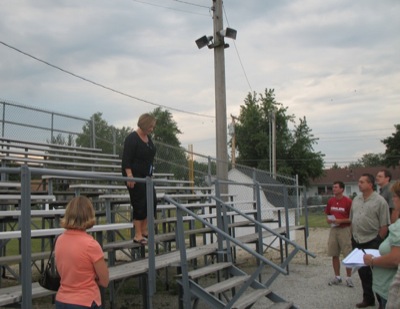Thursday, August 14th, 2008
Please hold the grease!
Inadequate plumbing at local restaurants costing city about $30,000 a year
By Shelley Grieshop
The city of Celina is asking county health officials to help them fight a sticky problem: grease.
Celina City Safety Services Director Jeff Hazel and Wastewater Treatment Plant Supervisor Kerry Duncan told health board members on Wednesday that grease from several area restaurants is clogging pipes, causing pumps to shut down and could be a potential public health hazard.
"It's impacting the system," Hazel told the board, which was meeting unofficially after the required number of members failed to appear for a quorum.
The problem, the men explained, appears to stem from the size of some grease interceptors at area food establishments - particularly the "hamburger joints," which dispose of large amounts of grease on a daily basis, Duncan said.
Restaurants are required to have grease interceptors or traps below their sinks that allow the grease to collect as it separates from the liquids disposed. The grease build-up is supposed to be removed from the trap periodically; businesses sometimes do it themselves or contract with an outside firm to remove it.
However, some of the traps aren't large enough and excess grease is getting into the city's pipes where it cools off and coagulates, the men explained. It can clog the independent lift stations, such as the one behind the former Wal-Mart building along Havemann Road, which pumps the wastewater to the city's water treatment plant, Hazel said.
The Wal-Mart lift station has given city workers the most problems, Hazel said.
"Five restaurants go into that one," he said.
When the lift station becomes clogged, city crews are summoned and a labor-intense repair is required - sometimes in the middle of the night.
"The city is spending about $30,000 a year because of this," often in overtime pay, Hazel added.
The expense has to be figured into the city's wastewater rates, he said.
If the greasy sludge makes its way to the treatment center it can shut down operations, the men said.
Duncan said backed-up wastewater lines have, on at least one occasion, caused overflow to spill out of a manhole cover. The spillage can constitute a public health hazard, he said. Board members agreed.
Hazel and Duncan said they'd like to have the health department approve a regulation mandating food establishments install a 1,000-gallon capacity grease interceptor. However, they realize not all types of food businesses need one and the mandate could be a financial burden for some.
"We certainly don't want to drive businesses out," Hazel said, adding there are currently 31 retail businesses in the city that offer some type of food to customers.
The men also said they aren't seeking immediate action but want to work with the health board for a solution.
County environmental Director Michelle Kimmel, who attended the meeting, said the type of regulations the men are hinting at are more stringent than the state currently requires. She reminded the board that any regulations adopted by them would apply to the entire county.
Kimmel said she did some research on the issue and found out Miami County - which Mercer County recently contracted with to obtain plumbing permits - requires new businesses to have a minimum 1,000-gallon grease interceptor.
Kimmel said Ohio Department of Health officials told her that businesses are required to follow a food code that states plumbing has to be maintained in a good condition - a statement that could be used as support for stiffer regulations.
Amended regulations could be substituted for existing businesses, Hazel said, as he showed the board a copy of similar regulations in use in Greensboro, S.C.
Duncan suggested that businesses be required to record their grease disposal practices and make them available to officials on a regular basis. Currently, there are no monitoring systems in place, he said.
Board members suggested bringing in other municipalities in the county for feedback on the issue. However, because of the lack of required board members, no action could be taken.
Another meeting date was not yet announced at press time to replace Wednesday's unofficial health board meeting.

